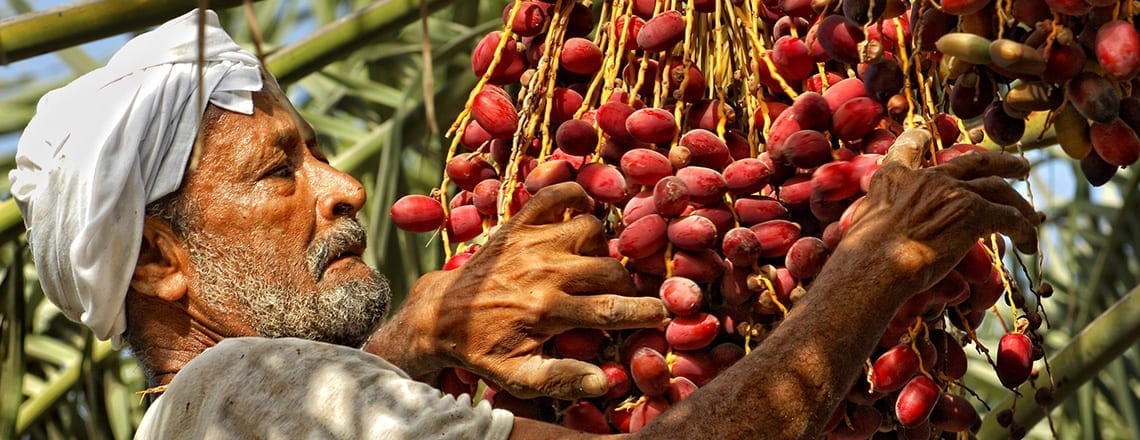
May 23, 2016
Update: The survey is now available in Spanish and French.
La encuesta está disponible en francés y español.
L’enquête est disponible en français et espagnol.
The United Nations Special Rapporteur is partnering with the Solidarity Center to research a report on the links between the political, social, and economic exclusion of workers, their associations and trade unions. The following article from the UN Special Rapporteur website describes how you can participate.
The globalization of the world economy in the past half-century has contributed to a dramatic rise in the power of large multinational corporations and has concentrated wealth in fewer hands. State power to regulate these business entities, meanwhile, has been simultaneously eroded and co-opted by elite economic actors themselves.
Unconstrained power – whether public or private in origin – is now, more than ever, a critical threat to the protection of human rights. This power shift has created a challenging environment for the enforcement of human rights, as Special Rapporteur Maina Kiai has documented in his two most recent reports on natural resource exploitation and the imbalance between how States treat businesses and civil society.
For his next report to the UN General Assembly (October 2016), the Special Rapporteur plans to explore a new dimension of this power shift: its effect on the rights to freedom of peaceful assembly and of association of workers – specifically the most marginalized portions of the world’s labor force, such as global supply chain workers, informal workers, migrant workers and domestic workers. He will also examine the gender and racial dimensions of the issue.
The Special Rapporteur is particularly interested in the links between the political, social, and economic exclusion of workers, their associations and trade unions, as expressed in:
- The limitation and/or criminalization of assembly and association rights in law and in practice (and acquiescence of the State when these rights are breached by state or private actors);
- The exclusion of workers in the informal economy from legal frameworks recognizing assembly and association rights;
- The strategy to informalize more work for the purpose of limiting or excluding workers from exercising their assembly and association rights;
- The lack of effective global governance of migration, which has led to the exploitation of migrant workers
The Special Rapporteur will also explore the interplay between the lack of assembly and association rights for workers and the health of these rights within a society as a whole.
What’s your opinion and experience?
The Special Rapporteur convened an expert consultation to discuss this subject in May 2016. But he would also like to hear your views. He is particularly interested in specific, real-world examples of how the assembly and association rights of workers are being both eroded and bolstered. These examples may be included in the report.
How to submit information for the report
For more details on the report, please see our concept note. For specific questions that the Special Rapporteur is looking to answer, please see the following questionnaires. Note that each file has three separate questionnaires: One for UN member states, one for businesses and one for civil society/unions/workers. Please answer only the questionnaire that corresponds to your position:
Questionnaires in English
Questionnaires in Spanish (coming soon)
Questionnaires in French (coming soon)
In responding to the questionnaire, please be sure to provide as much detail as possible and to specify which countries you are referring to.
Completed questionnaires should be e-mailed to [email protected]. We will be accepting submissions until June 30, 2016. You may submit your responses in English, French or Spanish.
The Solidarity Center will assist with researching the report. Responses to the questionnaires will be shared with select Solidarity Center staff prior to the publication of the report.
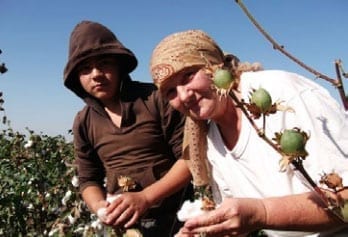
May 20, 2016
Uzbek human rights defender Elena Urlaeva has been detained against her will in a psychiatric hospital in Tashkent and the government should release her immediately, the Cotton Campaign said today. The Cotton Campaign is a coalition of worker rights and human rights groups that includes the Solidarity Center.
“Holding Elena Urlaeva in a psychiatric hospital without a clear medical rationale is a grave breach of medical ethics,” says Umida Niyazova, director of the Uzbek-German Forum for Human Rights (UGF). “She should be released immediately, and the Uzbek government must cease using hospitals as extrajudicial detention centers.”
Urlaeva’s Efforts Key to Reducing Child Labor
Urlaeva for years has documented forced labor in Uzbekistan’s cotton fields, where some 1 million teachers, medical professionals and others are forced to toil during harvest seasons. She has been credited with helping significantly reduce child labor in cotton fields, and this month was among human rights defenders in Uzbekistan to receive the International Labor Rights Forum 2016 Labor Rights Defenders Award.
Urlaeva was detained last year after interviewing and photographing teachers forced by government officials to work in the cotton fields, and says that she was physically assaulted during the subsequent interrogation.
The International Labor Organization (ILO) has pushed the Uzbek government to end forced labor. Following a complaint by Uzbek civil society, the World Bank attached covenants stipulating its loans to Uzbekistan could be stopped and subject to repayment if forced or child labor was detected in project areas by ILO monitors contracted by the World Bank to carry out labor monitoring during the harvest. In March, members of the Cotton Campaign urged the World Bank to make good on its promise.
Uzbek Government Targets Human Rights Defenders
The Uzbek government has responded to global pressure to end forced labor by cracking down on Uzbek labor rights activists who monitor cotton harvests.
Uktam Pardaev, another Uzbek labor rights activist was jailed while he was monitoring last fall’s cotton harvest in Uzbekistan and now is serving three years’ probation at his home, where he is under constant surveillance by security services. (You can take action to help Pardaev.)
Also last fall, Uzbek human rights defender Dimitry Tikhonov reported that his home office was burned and all the equipment and documentation he collected on Uzbekistan’s use of forced labor in the country’s cotton harvestsm destroyed. No other room in his home was touched by the fire, he said. Tikhonov also was arrested and beaten by police as he took photos of some 20 busloads of teachers and school employees forced into the cotton fields for the annual harvest. Tikhonov has since fled the country.
The stories of all three Uzbek human rights defenders are featured in a video created as part of the Labor Rights Defenders Award ceremony, in which a voice-over points out that “the Uzbek government treats them as enemies of the state because of their peaceful human rights activities.”
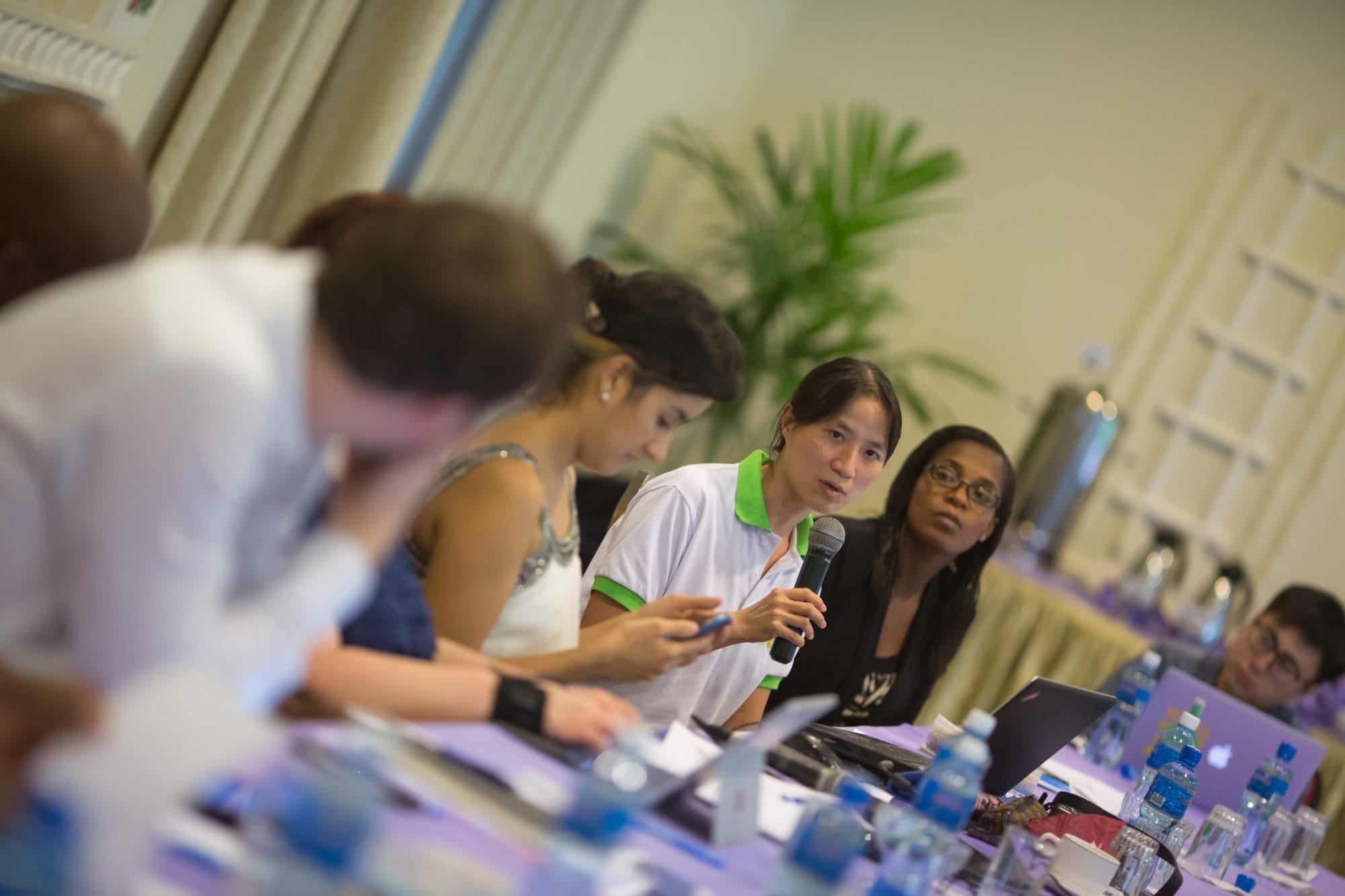
May 9, 2016
More than two dozen worker, union and human rights experts from around the world gathered last week in Kenya to discuss some of the most intractable global labor issues: informalization of work, gender inequality, migrant worker rights and the erosion of workers’ freedoms of peaceful assembly and of association.
The two-day “Expert Consultation on Freedom of Association and Assembly for Workers” was convened by Maina Kiai, UN Special Rapporteur on the Rights to Freedom of Peaceful Assembly and of Association (FOAA), in collaboration with the Solidarity Center. Shawna Bader-Blau, Solidarity Center executive director, co-facilitated the meeting.
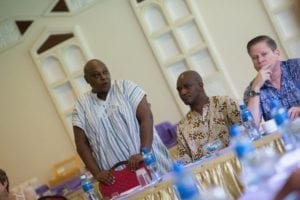
Maina Kiai (left) opens the discussion, with Wisborn Malaya (center) representing informal workers in Zimbabwe and Phil Robertson from Human Rights Watch. Credit: UN
High-level representatives from key organizations—Asia Monitor Resource Center; Asia Network for Rights of Occupational & Environmental Victims; Escuela Nacional Sindical (ENS, National Union School, Colombia); Human Rights House Foundation; Human Rights Watch; International Center for Not-for-Profit Law; International Corporate Accountability Roundtable; International Domestic Workers Federation; International Labor Organization; International Trade Union Confederation; Kenya National Union of Teachers; Kenya Union of Domestic, Hotels, Educational Institutions, Hospitals and Allied Workers (KUDHEIHA); Labor Research Service; National Guestworkers Alliance; Proyecto de Derechos Económicos, Sociales y Culturales (ProDESC, the Economic, Social and Cultural Rights Project, Mexico); Social and Economic Rights Institute of South Africa; UNITE-HERE; World Movement for Democracy; and Zimbabwe Chamber of Informal Employment Organizations—discussed the status of vulnerable workers and their rights, gender-based violence and discrimination, the ability of workers to exercise their rights to freedom of association and assembly, particularly in global supply chains.
The experts closed the meeting by looking at ways to bolster FOAA for vulnerable workers, including strengthening legal frameworks at the national level, monitoring and improving the practices of non-state actors, and establishing global governance mechanisms.
Discussions and conclusions from this consultation will feed into the Special Rapporteur’s next thematic report on the freedoms of peaceful assembly and association, which he will present to the UN General Assembly in October 2016.
“The Special Rapporteur’s focus on these very serious labor issues can have a real impact, and the organizations consulted during this kick-off meeting were excited to support the effort,” said Bader-Blau. “This is a critical moment for working people around the world, so many of whom are seeing their rights as workers deteriorate because the freedoms of association and assembly are under assault.”
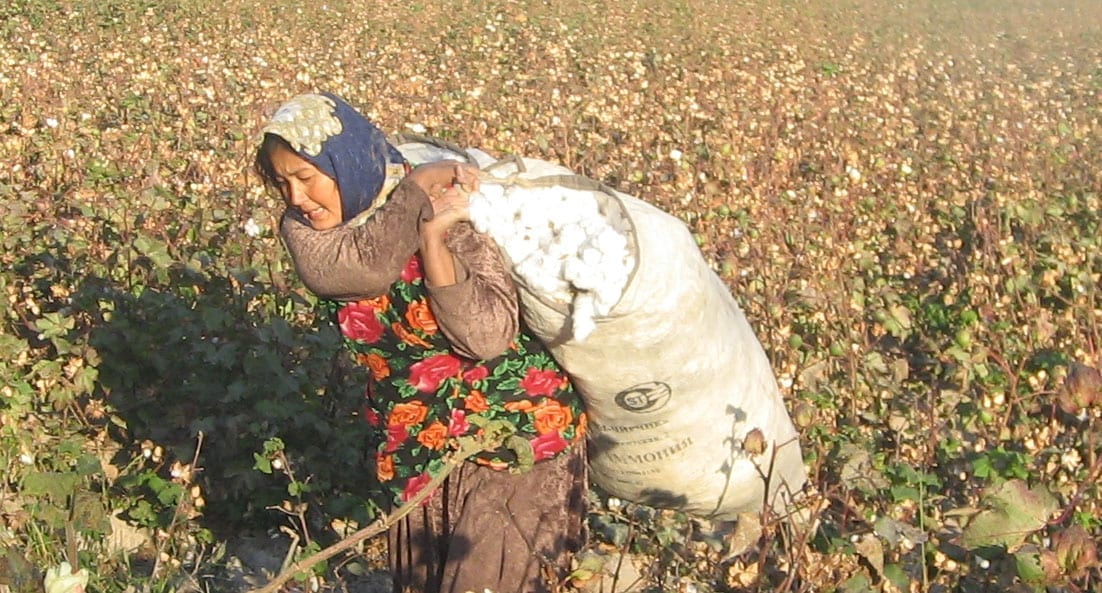
May 3, 2016
A global union campaign is calling on the Uzbek government to reverse its conviction of Uzbek human rights activist Uktam Pardaev, who was sentenced to three years’ probation in January and is under constant surveillance by security services at his home. Officials also continue to harass Uktam Pardaev’s relatives and friends, who have been watched, questioned and threatened, according to global union and human rights groups.
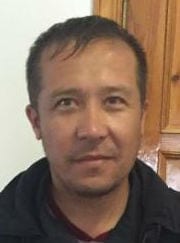
Human rights activist Uktam Pardaev was jailed while he was monitoring last fall’s cotton harvest in Uzbekistan. Credit: IUF
ardaev, a member of an independent cotton harvest monitoring group, was arrested in November 2015 on trumped-up charges of fraud and taking a bribe. He was held for eight weeks in pre-trial detention, where he was locked in a damp, cold cell with only a dirty mat to sleep on and little food. Pardaev says he witnessed officials torturing and mistreating detainees to coerce confessions and was beaten severely on one occasion.
Pardaev was among human rights activists monitoring last fall’s cotton harvest in Uzbekistan, where more than 1 million teachers, nurses and others are forced to pick cotton for weeks each harvest season. A report released in March documented how the government took extreme measures to cover up its actions last fall, jailing and physically abused those independently monitoring the process.
“The government unleashed an unprecedented campaign of harassment and persecution against independent monitors to attempt to cover up its use of forced labor while taking pains to make widespread, massive forced mobilization appear voluntary,” according to The Cover-Up: Whitewashing Uzbekistan’s White Gold.
Uzbekistan, which gets an estimated $1 billion per year in revenue from cotton sales, faced high penalties for not addressing its ongoing forced labor. But rather than end the practice, the government sought to cover it up, according to the report, produced by the Uzbek-German Forum for Human Rights.
Take action now and send a message of support calling on the Uzbek government to reverse Pardaev’s conviction; conduct a prompt, independent, and impartial investigation into his credible allegations of ill-treatment by prison officials; and bring those responsible
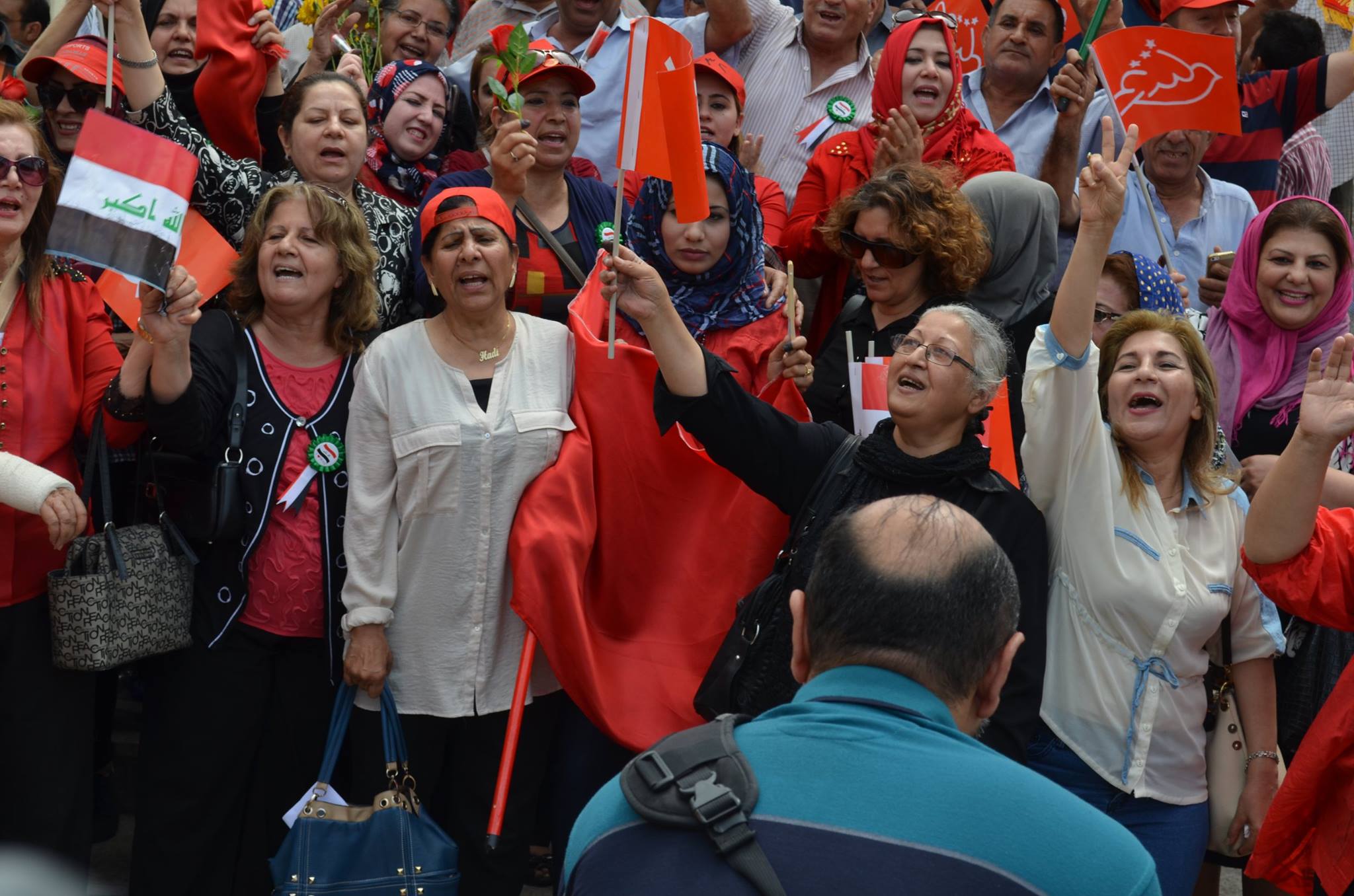
May 2, 2016
Iraq unions successfully pushed for a new labor law because of their unified solidarity and with strong support of the U.S. and global union movements, according to a new documentary.
“Finally, after 12 years of persistent and consistent work, the Iraq labor movement was able to succeed with their international partners and with Iraq civil society … to get worker rights in Iraq,” says Michael Zweig, speaking in the video. Zweig is director of the Center for Study of Working Class Life at Stony Brook University, which produced the video.
“It’s a very big deal,” he said.
“Light from the Darkness: The New Iraq Labor Law” looks at the key role of U.S. Labor against the War in rallying support of the U.S. union movement in support of Iraqi workers’ struggle for labor rights after the fall of Saddam Hussein.
“Labor solidarity was something a … steel worker or paper worker or janitor in the United States could understand. They knew that every worker in the world should be treated fairly,” said Gene Bruskin, co-founder of USLAW.
Also speaking the video, Solidarity Center Executive Director Shawna Bader-Blau says, “the role of U.S. Labor against the War was so important in galvanizing the support of American workers for…reaching out and educating thousands of thousands of American workers through their unions around the U.S. and around the world through their global outreach.”
Passed by the Iraqi Parliament in August, the labor law allows for collective bargaining, limits child labor, improves rights for migrant workers, provides better protections against discrimination at work and is the country’s first legislation to address sexual harassment at work. The law also enshrines the right to strike, banned since 1987.
Says Bader-Blau: “The Solidarity Center and U.S. Labor against the War were there for Iraqi workers.”
Check out “Light from Darkness.”







